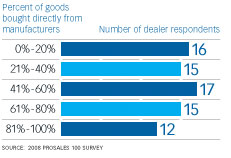Getting an Edge
With the housing market still soft, dealers and distributors are scrambling for business wherever they can find it. In some cases, that means promoting a specialty product or service to give their companies an edge with builders and remodelers.
“The key to this business is diversity,” says Ken Schulz, purchasing manager for Parr Lumber, which operates yards in Oregon and Washington state. “If we were depending on 2x4s and CDX only, we’d be having a hard time right now.”
Parr is a strong proponent of buying through two-step distribution, essential for specialty products with a lot of colors and styles, like composite decking.
“Distributors are able to carry a much wider selection than we ever could,” Schulz says. When asked why a builder doesn’t circumvent Parr and buy directly from specialists or manufacturers, Schulz says Parr can offer better value, including lower prices and ordering flexibility.
Simplifying the purchasing process is a pathway to success for any distributor, says George Stark, a senior vice president and director at the Boston Consulting Group, who spoke recently at a conference conducted by Builder, a magazine covering the housing industry published by Hanley Wood, ProSales’ parent company.
Stark offered his audience five strategies that he believes they need to implement now to be successful in the future. One of these is “exploiting complexity,” which starts with recognizing that the 20% of customers from which most companies get 80% of their sales “have very different needs and requirements.”
One case in point might be Royal Construction Group in Boynton Beach, Fla. Its multiple businesses include Timber Specialists, which provides builders with trusses and other components. Royal prefers using exotic woods “and other hard-to-find stuff,” says vice president Brian Goldberg, and its supply source usually depends on an order’s size.
“We’ll go mill direct on big orders, but a mill isn’t going to send you 12 sticks,” he says. That’s where dealers like 84 Lumber and local wholesalers enter his world as fill-in sources, especially since his company does not have warehouse capacity.
Deeper and Cheaper
Stark notes that while suppliers with narrower product offerings are often lower-cost providers, those that can make buying from them as painless as possible are “rewarded with more sales.” Stark specifically points to Grainger Industrial Supply, the giant distributor in Lake Forest, Ill., which provides customers with an easy-to-use online tool that lets them quickly find information about any of the 250,000 SKUs in Grainger’s electronic catalog.
The role that any distributor plays in the supply chain is proportional to the complexity of a buyer’s purchasing needs. “It’s one thing for a builder to cut a [direct purchasing] deal [with a manufacturer] on stoves or refrigerators that don’t have a lot of items,” says Hal Look, Orco Construction’s senior vice president of marketing and business development. “But certain categories have a zillion combinations, which would be impossible for us to manage ourselves” and coordinate with customers, Look says. Orco itself deals with 60,000 parts.
“The hottest thing right now is retail asset protection,” says Steve French, sales director for distributor Jewett Cameron of North Plains, Ore., which specializes in metal products. “Funding the inventory falls on the distributor’s shoulders,” which he says has been especially important when the housing market is so vulnerable.
Look explains that when Orco, which is based in Livermore, Calif., and has 19 locations in three western states, brings on a new line, it might start out buying the products directly from the manufacturer. But after an initial order, the dealer probably would buy through a distributor because “the product hasn’t matured enough” to merit the minimums necessary for direct shipment. “The two-steppers augment our ordering,” he says.
When asked if he’s worried about one-steppers expanding into new lines that might encroach on Orco’s business with pros, Look says he sees such moves as short-term survival tactics.
“A lot of these guys had all their eggs in the production builders’ basket, and right now they’re not selling anything, so they’re trying anything that will sell,” he says, “whether it’s TVs or paper plates.”


